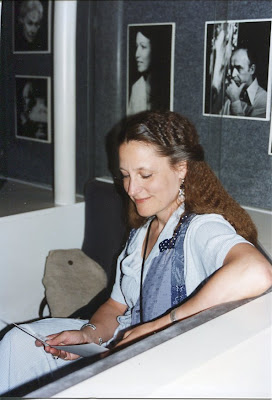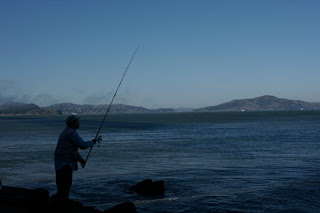 Jayne Anne Phillips has a brilliant new book due out this coming January. A brilliant book: Faulkneresque. Unblinking. Committed. Not a shred of fear. It's called Lark & Termite, and in a future post I'll be getting to that, but for now, as I sit curled over the galleys, as I sit here celebrating Jayne Anne's unsinkable talent, I remember my first days with this writer, I remember an essay I once wrote. Because she is a rare, living legend, a rare female living legend, I post parts of that earlier piece here today, to provide context for what I'll post next week.
Jayne Anne Phillips has a brilliant new book due out this coming January. A brilliant book: Faulkneresque. Unblinking. Committed. Not a shred of fear. It's called Lark & Termite, and in a future post I'll be getting to that, but for now, as I sit curled over the galleys, as I sit here celebrating Jayne Anne's unsinkable talent, I remember my first days with this writer, I remember an essay I once wrote. Because she is a rare, living legend, a rare female living legend, I post parts of that earlier piece here today, to provide context for what I'll post next week.
I met Jayne Anne Phillips in a city of puppets, on a night of daggering rain. It was Prague, the summer of 1995. She was across a gilded reception room, near a table piled high with apples and cheese, and I remember watching how she moved through the writers who had assembled there—moved through them, touched a hand to them, but escaped them just in time. Her long crimped hair sat on her shoulders like a cape. She seemed unspoiled by the rain.
Standing there, observing Jayne Anne, I was struck by contradictions, as readers of her work have always been. Here was the woman who had yielded characters who marched straight out of the dark side and spoke: Jamaica, you black doll, wobbling like a dead girl sewn of old socks …. Here was the author of tender reminisce: My mother’s ankles curve from the hem of a white suit as if the bones were water. Here was the teacher with the reputation for being obsessed with the miniscule, the line edit, the word and its hyphen, the punctuation mark. Here was the mother both saddled with beauty—charcoal blue eyes, sun-darkened skin, a photogenic nose and chin—and famously uncomfortable with beauty’s dark allure.
It occurred to her, I never did ask why, to speak to me that night. When had I gotten to Prague? Where was I from? Had I gone to the castle across the bridge? Had I seen the big cathedral? This morning, I said. Pennsylvania, I said. And no, I’d seen neither castle nor cathedral, though I’d hoped to at one point, when there was time. She asked me to call her the following morning at ten. She said we’d go see things together.
We spent the next day jostled by the summer crowds of Prague, Jayne Anne and me, our families. We spent it beneath pinched-high roofs, beside confessionals, in the trapped light behind stained glass. Cathedral and castle. Gardens and walls. Heat, and the sound of singers singing. It was mid-afternoon before we made our way back, over the bridge. We bought postcards and jewelry and architectural miniatures, then parted ways in Mala Strana.
Over the next ten days I got to know Jayne Anne, quietly and slowly. If she was cautious in among the crowds, she was generous in private. If she was guarded about the price of fame, she spoke without pretension. She talked about stories, about words, about the book that she’d been writing. She talked about the carnival that is the writer’s life. She asked questions, too—what it was that made me write, where I thought I might be going, what I hoped to get from books, and over coffee and hot chocolate and one kind of cookie then the next I said that I was writing because I always had, because I couldn’t break the habit. I said I was writing because I believed that words could be morally persuasive.
In Prague I wasn’t a writer yet; I was just a woman, writing. I was just a woman with a writing dream, and Jayne Anne listened to it. After ten days went by, I left for home; after more time passed, I got a postcard. A portrait of a Ferris wheel on the banged-up front, and on the back, a single gesture: Dear Beth, it said, are you really gone? No. No. You’re still here with us.
Being out in the world now with books of my own, I am overwhelmed when I think back on Prague, Jayne Anne, and castles. I know the price of advice, I know the weight of strangers’ manuscripts, I know the urgency behind the questions: Read me? Know me? Teach me? Promote me? Love my book? Make me a writer? When you lean in the direction of another’s work, you lean precariously out of your own. When you attend to the dreams and works of others, you are thrown from the path you had been on. In Prague I was a stranger—unknown, prone, as I continue to be prone, to wrecking sentences with elaborate extensions. I was living on the other side of books—unpublished, unread, linguistically ungainly—and still, on a night of rain, in a city of puppets, Jayne Anne asked if I had seen a castle. She opened a door, and I walked through. I invaded her world with my own.
Like the architect, the writer is a romanticized profession. It is the lavish drunkness of F. Scott Fitzgerald, the outrageous cruelty of Sinclair Lewis, the staggering machismo of Ernest Hemingway, the infidelities, always that. We love the brokenhearted writer. We love the beg for forgiveness, the confession of betrayal, the fragile ego smashed wide apart in the finest final pages. Writing, the myth goes, is tenderness reserved for the book, intelligence transferred to fiction, generosity given over to scene, and the writing life is the life that’s lived subservient to stories. Thieves, writers are, and shadows drag behind them. And wherever writers claim to broker the truth, they cast, instead, a net of lies.
It is the irreproachable loneliness of the writer we’ve come to expect, the miserly way they parcel out their flecks of available love. Those who love too much get nowhere. Those who teach will never sell. Those who give back cannot be classified as genius. Those who cede the stage are thrust aside. Don’t expect a thing from a writer but their books. Don’t look for their decency anywhere but before you, on the page.
Except I cannot prove the myth. Except I have lived within the graces of its polar opposite. I have opened my mailbox to a postcard from Michael Ondaatje, a careful, intricate, telling response to a letter I had written. I have found a pen in my mailbox, too—a gift from a novelist I met only once, after standing in line for hours at a bookstore. A writer friend brought my son paper stars, and another writer sent me seeds, and a writer’s blueberries have arrived as well—overnighted to preserve their wild freshness. And one day an orchid appeared with two dozen purple blooms and, another day, a pillbox from Dubai and always books and, astonishingly, more seeds and three packages of saffron, and a jar of jam and a bundle of photographs, a pen, a chocolate bar, a ceramic dragonfly, a subscription to a magazine. Dear Beth, are you really gone? No. No. You’re still here with us.
It is from the gifts and notes of writers that I have learned what writing is. It is how writers have reached far beyond their books that has rescued me from absurd and brazen dreams and taught me what really matters. What I thought writing was writing isn’t. How I thought writers were at least some writers aren’t. Where I thought I’d take my rewards, I have found nothing worth my keeping. Where I expected little, I’ve been overcome with flavor. If I thought I could write myself into kindness with words, I have learned, from my writer friends to know the extent of the possible. If I thought I’d write my way to truth, I have been helped to redefine my purpose. Memory is not memoir. Truth supercedes the tale. Arfulness induces artifice. And writing a book is not publishing a book. And being a writer sometimes means that one does anything but writing. And.
Lost, often lost in the dispiriting mechanics of publishing, or the disappointments of the trade, or the injustice that can be done to an ambition or a story, I have found my anchor in other writers, in the gifts and cards and emails that have floated in, across the nether. Beth, we are writers by virtue of our stance to the world. Plus the act makes us feel good. Writing makes me like myself. One email, out of many. It is such a scary time, when your novel is tender and green and you feel if it is not tended it must just dry up and blow away. Another. Don’t want to be that famous anymore, so we’ve cured each other, you and me, maybe.
When I was a child aspiring to be a writer, I never dreamed about growing up and knowing other writers; I wasn’t that audacious. I thought about how putting words together made me feel. I thought about riding a train and seeing my book on a stranger’s lap. I thought about the view I’d have from my writing window, and the places I’d go to find story, and the books I’d have stacked around me like old friends. What I knew about writers I’d know from their books; that was the assumption I’d made. Writers wouldn’t have the time, just as I wouldn’t have the time, to talk about books and their making.
But now I am on the other side of books, and what has begun to matter most to me is those who make the writing right. I celebrate the wisdom of writers and what they know. I celebrate the life I live, in writerly company. I celebrate the notes that I wake up to, the attention, the succor, the decency, the humor, the honorable and companionable quality of the endless conversation. It isn’t finally about writing. It is finally about living. It is about reaching out and listening, imagining another.
Read more...




































